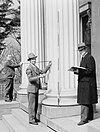File:Entrance Portico and Pilaster Details - National Home for Disabled Volunteer Soldiers, Mountain Branch, Barracks No. 2, Lamont and Veterans Way, Johnson City, Washington HABS TN-254-B (sheet 4 of 7).png

Original file (13,600 × 17,600 pixels, file size: 4.21 MB, MIME type: image/png)
Captions
Captions
| This image is a JPEG version of the original TIF image at File: Entrance Portico and Pilaster Details - National Home for Disabled Volunteer Soldiers, Mountain Branch, Barracks No. 2, Lamont and Veterans Way, Johnson City, Washington HABS TN-254-B (sheet 4 of 7).tif.
However, any edits to the image should be based on the original TIF version in order to prevent generation loss, and both versions should be updated. Do not make edits based on this version. |
Summary edit
| Warning | The original file is very high-resolution. It might not load properly or could cause your browser to freeze when opened at full size. |
|---|
| Entrance Portico and Pilaster Details - National Home for Disabled Volunteer Soldiers, Mountain Branch, Barracks No. 2, Lamont and Veterans Way, Johnson City, Washington County, TN | |||||
|---|---|---|---|---|---|
| Photographer |
De Sousa, Daniel |
||||
| Title |
Entrance Portico and Pilaster Details - National Home for Disabled Volunteer Soldiers, Mountain Branch, Barracks No. 2, Lamont and Veterans Way, Johnson City, Washington County, TN |
||||
| Description |
U.S. Department of Veterans Affairs; Freedlander, J. H., architect |
||||
| Depicted place | Tennessee; Washington County; Johnson City | ||||
| Date | 2011 | ||||
| Dimensions | 34 x 44 in. (E size) | ||||
| Current location |
Library of Congress Prints and Photographs Division Washington, D.C. 20540 USA http://hdl.loc.gov/loc.pnp/pp.print |
||||
| Accession number |
HABS TN-254-B (sheet 4 of 7) |
||||
| Credit line |
|
||||
| Notes |
The winning competition design for the Mountain Branch by New York architect Joseph H. Freedlander incorporated the latest ideas of comprehensive design and Neoclassicism as taught by the Ecole des Beaux Arts in Paris. Freedlander created a hierarchy of communal buildings, barracks, and service functions arranged along a central avenue with views south to the nearby mountains. Barracks No. 2 was one of two so-called "Brownlow barracks" built for veterans residing at the Mountain Branch. Along with Building No. 1, it occupies a prominent location next to the Mess Hall along Dogwood Avenue (originally McMahon Avenue), the main axis of the site plan. Other smaller barracks located to the north on secondary axes had similar plans but plainer, simpler exteriors. Building No. 2's prominent location and ornate limestone and terra cotta exterior made it one of the showpiece French Renaissance Revival structures for the Branch. Three floors and a full basement provided open ward dormitories, bathrooms, recreation rooms, lounges, and storage for the resident veterans.
|
||||
| Source | https://www.loc.gov/pictures/item/tn0396.sheet.00004a | ||||
| Permission (Reusing this file) |
|
||||
| Other versions |
  |
||||
| Object location | 36° 18′ 30.17″ N, 82° 22′ 28.91″ W | View this and other nearby images on: OpenStreetMap |
|---|
File history
Click on a date/time to view the file as it appeared at that time.
| Date/Time | Thumbnail | Dimensions | User | Comment | |
|---|---|---|---|---|---|
| current | 06:07, 21 August 2014 |  | 13,600 × 17,600 (4.21 MB) | Fæ (talk | contribs) | {{Compressed version|file=File:Entrance_Portico_and_Pilaster_Details_-_National_Home_for_Disabled_Volunteer_Soldiers,_Mountain_Branch,_Barracks_No._2,_Lamont_and_Veterans_Way,_Johnson_City,_Washington_HABS_TN-254-B_(sheet_4_of_7).tif|thumb=nothumb}} ==... |
You cannot overwrite this file.
File usage on Commons
The following 6 pages use this file:
- File:Cover - National Home for Disabled Volunteer Soldiers, Mountain Branch, Barracks No. 2, Lamont and Veterans Way, Johnson City, Washington County, TN HABS TN-254-B (sheet 1 of 7).png
- File:Cover - National Home for Disabled Volunteer Soldiers, Mountain Branch, Barracks No. 2, Lamont and Veterans Way, Johnson City, Washington County, TN HABS TN-254-B (sheet 1 of 7).tif
- File:Entrance Portico and Pilaster Details - National Home for Disabled Volunteer Soldiers, Mountain Branch, Barracks No. 2, Lamont and Veterans Way, Johnson City, Washington HABS TN-254-B (sheet 4 of 7).png
- File:Entrance Portico and Pilaster Details - National Home for Disabled Volunteer Soldiers, Mountain Branch, Barracks No. 2, Lamont and Veterans Way, Johnson City, Washington HABS TN-254-B (sheet 4 of 7).tif
- File:First Floor Plan - National Home for Disabled Volunteer Soldiers, Mountain Branch, Barracks No. 2, Lamont and Veterans Way, Johnson City, Washington County, TN HABS TN-254-B (sheet 2 of 7).png
- File:First Floor Plan - National Home for Disabled Volunteer Soldiers, Mountain Branch, Barracks No. 2, Lamont and Veterans Way, Johnson City, Washington County, TN HABS TN-254-B (sheet 2 of 7).tif
Metadata
This file contains additional information such as Exif metadata which may have been added by the digital camera, scanner, or software program used to create or digitize it. If the file has been modified from its original state, some details such as the timestamp may not fully reflect those of the original file. The timestamp is only as accurate as the clock in the camera, and it may be completely wrong.
| Horizontal resolution | 28.35 dpc |
|---|---|
| Vertical resolution | 28.35 dpc |

